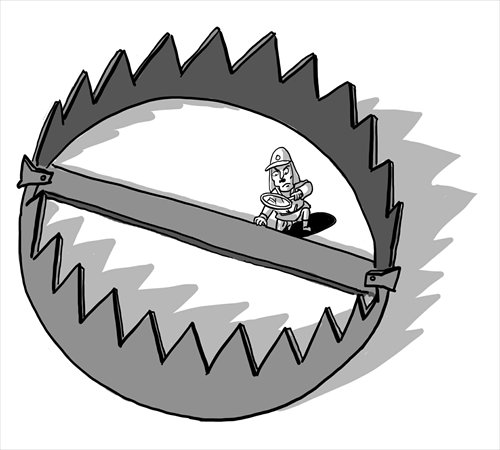HOME >> OP-ED
Global focus needed to counteract Japanese right
By Ding Gang Source:Global Times Published: 2014-2-19 20:13:06

Illustration: Liu Rui/GT
Although the two issues that complicate China-Japan relations, the Diaoyu Islands dispute and Japanese politicians' visits to the Yasukuni Shrine, are related to the histories of both countries, in essence, they are not just issues between the two countries.
The outrage and vigilance of Chinese are not enough to curb the arrogance and aggressiveness of the Japanese right wing. If the international community views the conflicts between China and Japan only as a bystander, global opinion pressure on the Japanese right wing cannot be formed.
In the foreseeable future, China-Japan relations will remain deadlocked. If China focuses on competition with Japan, its strategic aim of national rise will be affected.
Time is needed to solve the two historical issues. But this does not mean that we have to stall here or that we can only adopt a pressing strategy.
In fact whether the deadlock can be resolved depends on whether we can move beyond this bilateral relationship. Let's set aside the disputes between the two and imagine China in 20 or even 50 years time.
Professor Ezra Vogel of Harvard University argues in his book, Deng Xiaoping and the Transformation of China, that during Deng's era the two countries cooperated well, since Deng's vision went far beyond the relationship between China and Japan.
What China needs to do now is to have a clear definition of its future, and have a road map for constructing a collective security system on its periphery. At least, it should set different goals for different times.
China has begun multilateral cooperation on many levels in its neighboring areas such as the South China Sea, Central Asia, Southeast Asia and South Asia. Making this systematic and institutionalized should be the next focus.
In areas such as fishery, sea, finance and environmental protection, there is huge cooperation potential between China and its neighboring countries. Sometimes, a small-scale maritime or fishery cooperation project may open the door for future cooperation on a comprehensive scale.
We also need similar farsightedness regarding Japanese officials' visits to the Yasukuni Shrine. This doesn't mean ditching the issue, but instead considering it from a long-term perspective.
We might take a mild attitude toward Japan for now. We can consider how we can depict that period of history in a way that the whole world could accept.
In recent years, China has given a severe blow to Japan over its officials visiting the Yasukuni Shrine. However, it did not arouse much international attention. The problem is that we have never depicted this issue from the perspective of universal values such as humanity or war and peace.
A number of Chinese ambassadors published articles on foreign media, blasting Japanese Prime Minister Shinzo Abe's shrine visit, but why have none of these embassies organized exhibitions on the history of the Nanjing Massacre in 1937 or other war crimes denied by Japan's right wing?
The dispute between China and Japan is not a matter of the two, but a matter that concerns the peace of Asia and the world. Similarly, the crimes of the Nazis have never been an issue between only Germans and Jews, but an issue for the world.
Holding global seminars about the Nanjing Massacre, establishing overseas memorials about the history of China's fighting during WWII, and making films that reveal the atrocities of the Japanese army are steps that we can take yet are not doing.
One of the tests for China to establish credibility in Asia is how it can utilize both its hard power and soft power to form a mechanism that can restrain any trend toward war.
There may be many historical traps that lurk within relations between China and its neighboring countries. We can blunder into the traps, or we can dodge them.
The author is a senior editor with People's Daily. He is now stationed in Brazil. dinggang@globaltimes.com.cn. Follow him on Twitter at @dinggangchina
Related articles:
Respect will serve Chinese diplomacy best in long run
Posted in: Ding Gang, Critical Voices